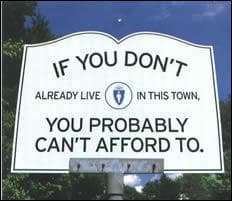The Volokh Conspiracy
Mostly law professors | Sometimes contrarian | Often libertarian | Always independent
Progress in the Struggle Against Exclusionary Zoning
Reforms in multiple jurisdictions could help loosen restrictions on development that infringe on property rights, inflate housing prices, and cut off large numbers of people from job opportunities.

There may not be a lot of good political news these days. But one notable exception that should cheer you up during the holiday season is the gradual progress being made towards cutting back on exclusionary zoning in multiple jurisdictions around the country. Earlier this month, I wrote about how the city of Minneapolis achieved a major breakthrough by abolishing single-family home zoning requirements throughout the city. Since then, Oregon House speaker Rep. Tina Kotek has introduced a bill in the Oregon state legislature that would abolish such mandates throughout nearly the entire state (with the exception of very small communities). Kotek's bill would make Oregon the first state to cut back on single-family zoning requirements to such a great extent, and would do much to alleviate housing shortages by deregulating housing construction statewide. The very fact that this is an initiative proposed by the Speaker of the House increases the likelihood of success.
The City of San Francisco, long notorious for having some of the most restrictive zoning rules in the entire country, recently abolished minimum parking requirements for new construction. This might not seem like a big deal. But such mandates add many thousands of dollars to the cost of new housing construction, and thereby reduce the amount of housing, and raise the price of what is available. San Francisco still has numerous other restrictions that block housing development. But this is a notable step in the right direction, and follows in the footsteps of several other cities that have adopted similar reforms.
It's worth noting that abolishing parking requirements and single-family home zoning mandates would not forbid the construction of either single-family homes or buildings with lots of parking spots. It would merely permit the construction of new housing of other types, which previously had been banned. But, in so doing, these reforms would facilitate a great deal of new construction, and thereby reduce housing prices.
Finally, California state Senator Scott Wiener has introduced Senate Bill 50, a revised version of last year's failed SB 827, which would have greatly reduced zoning throughout much of the state. The new version includes some unfortunate (though perhaps politically necessary) concessions to NIMBYism, such as allowing many communities to get a 5 year exemption from the law, and a ban on developers' demolishing current rental housing to take advantage of the new rules. The latter exemption prevents old housing from being replaced with newer buildings that could house more people or provide better-quality amenities.
Nonetheless, if SB 50 passes, it would still represent massive progress, for much the same reason as SB 827 would have, had it passed. And the new version also has some improvements over the old one, as well, including expanding its scope to cover "jobs rich" communities, as well as those near transit facilities. Whether SB 50 will succeed where its predecessor failed remains unclear. But it's at least a good sign that advocates believe they have a real chance.
Why should any of this interest you, unless you're planning to rent or buy a home in one of the affected communities? The answer is that exclusionary zoning is possibly the most important policy issue most nonexperts have never heard of. In addition to greatly increasing housing costs, it also cuts off many poor and lower-middle class Americans from valuable job opportunities, thereby greatly reducing economic growth and cutting GDP by as much as 9.5%. It is one of the main factors holding back both poor minorities and working-class whites, and preventing millions of Americans from having the opportunity to "vote with their feet" for areas that offer greater opportunity.
The issue unites economists and land-use scholars across the political spectrum. But until recently, progress has been stymied by a combination of public ignorance and resistance by powerful interest groups. But the firewall holding back zoning reform finally seems to be cracking.
Obviously, the struggle is far from over. The reforms discussed above only represent incremental progress, and none go as far as I and other libertarians would want - or even as far as many mainstream liberal economists would want. But they are important steps in the right direction. And the more such efforts succeed, the more they might stimulate imitation in other cities and states. That's a thought that should bring some cheer during the holiday season!


Show Comments (85)